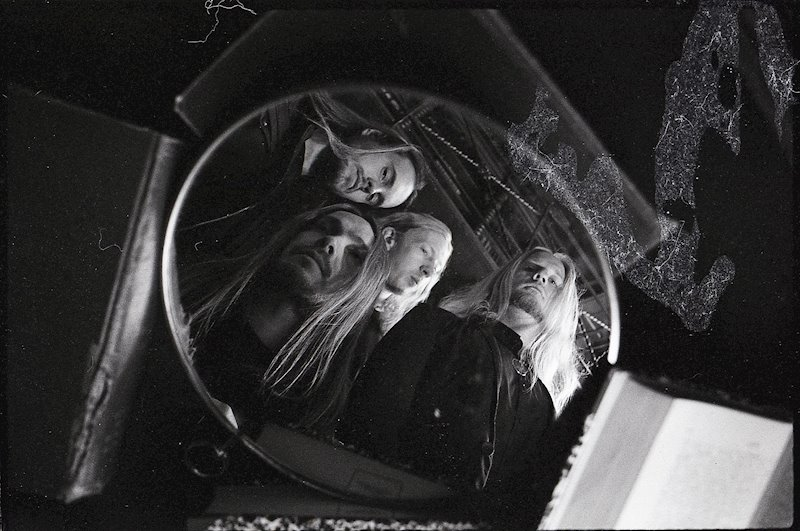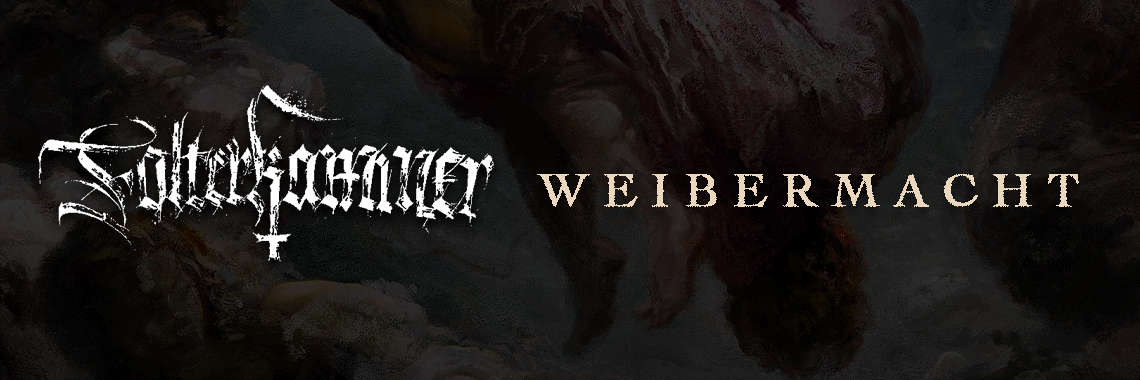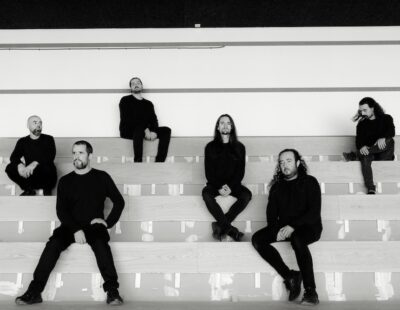
UK black metallers Lychgate aren’t on the ordinary spectrum. Just as Ved Buens Ende and Thorns were to ’90s black metal, the London-based outfit are to today’s black metal. They’re unconventional, they’re confrontational (to the genre’s tenets), and they’re undeniably haunting (their thematic palette is palatable), especially on new album, The Contagion in Nine Steps (Blood Music). Over the course, of the album’s chilling 42 minutes, Lychgate paint pictures horrifying, intimidating, and melancholic. They are the house on the hill that nobody comes back from. They are the silent evil that corrupts. They have the power of persuasion. So effective are the Brits in their craft, that The Contagion in Nine Steps isn’t entirely an easy listen. Not on purpose, but by sheer will of the creators.
Tracks “Republic,” “Atavistic Hypnosis,” and the amazing closing track “Remembrance,” which Decibel premiered in January (HERE), are the soundtrack to the movie HP Lovecraft would’ve made had he been a filmmaker; They’re the score to the Stephen King adaptation that made us fear film; They’re the teaser music for the movie William Friedkin will never make. In short, Lychgate are visual composers. So enamored by The Contagion in Nine Steps, as we were with An Antidote for the Glass Pill (HERE and HERE) that we had to catch up with lead Lychman Vortigern. So, read on as Vortigern reveals what Lychgate are and are not in 2018. The best black metal band since Deathspell Omega? Possibly.
The Contagion in Nine Steps reminds me of Comus. Like Comus playing black metal. How far off the mark am I here?
Vortigern: Honestly, Comus is not to my taste. However, there are many other progressive bands from the ’70s that I appreciate. I can only consider around two of them as genuine influences for this project (Art Zoyd and Univers Zero). The rest are just artists that I appreciate, but not in any way that could have shaped what I/we do. The progressive thing in Lychgate is more of a coincidence–we’re just doing something different. That’s how I see it.
How important was it to stray off the beaten path? Song-to-song, detail reveals itself over time, but The Contagion in Nine Steps is a challenging listen.
Vortigern: Again, in all honesty, it’s also just a coincidence. I don’t think I ever literally thought at one point, “let’s do something different.” This album represents a snapshot of ideas from Lychgate for the composition time period 2015-17–the state of evolution of the project at that time. The sound of Lychgate is still growing and developing in ways that will continue to take it off the beaten path.
The organ, however, is not as prominent. Was that by design?
Vortigern: This time it was quite a deliberate thing to be more varied in the use of keyboard instruments, so that we could also include piano and mellotron. I didn’t want each album to use the same approach. So, in the future, for album four, I can imagine the organ being more prominent again, but in a fresh way.
But there’s still that “old creepy house” vibe to the music. As if the listener is thrust into a world where peculiar things happened on the land the house was built in pre-history and continue to manifest long after the house was built and its occupants have abandoned it, due to the peculiarities they’ve encountered and have considered unnatural. Where was your mind at visually when writing The Contagion in Nine Steps?
Vortigern: I think it’s interesting how one’s surroundings make one feel. There are different vibes from different countries, which includes the weather of course, but also a wide variety of cultural characteristics. Being based in Europe and growing up in the UK has been important for shaping my perception of surroundings–for example, the history and architecture. These have contributed to the visual inspirations. On other occasions the visual influence has been completely different. I was traveling in southeast Asia two years ago and saw the strangest (disturbing) photo imaginable of a human doll. That was inspiring in itself, but by merely describing it, it would be difficult to convey why that was so. For The Contagion album in general though, I was visually inspired by more claustrophobic and decaying aspects that one can experience when living in London. I don’t live there anymore, but part of that commuting/working lifestyle I did in London for a few years had an impact.
Then again, can Lychgate be considered black metal? Certainly, the tenets aren’t observed, at least from a traditionalist’s point of view.
Vortigern: I like to think of it as “coming from” black metal but departing from it. The outcome is a natural byproduct of various influences–not just black metal. So, no, I would not say that it can be considered truly black metal, but it’s not doom or progressive metal either. It’s some kind of combination of all three, whilst not really sounding like any other band when it comes down to it; mainly due to the influences that have contributed to the project from outside metal.
Musically, how do you separate Lychgate from the other bands the members are involved in? Like Ancient Ascendant, Acherontas, Macabre Omen, and, of course, Esoteric.
Vortigern: Ultimately, those are just other bands that members in Lychgate play in. It’s not really a connection in any way because the members in Lychgate are performing musicians, bringing their signature characteristics to the overall sound, but also creative input on some occasions.
Lyrically, Lychgate can be a bit freer than most. The song titles are ambiguous, at least not directly referring to anything within the metal vernacular, like Satan, darkness, abyss, or similar words or concepts prominent in the genre. What are Lychgate conveying on The Contagion in Nine Steps?
Vortigern: But the song titles are not really ambiguous if we know the themes. The primary inspiration for this album was Stanisław Lem’s novel The Invincible, which describes a planet where micro-machines have evolved to dominate in swarms. Individually they are nothing, but they triumph over humans en masse and not through intellectual superiority. Call it random if you like, but for me it was the impetus for further thinking–a kind of loose and inspiring analogy for examples of swarm behavior in civilizations throughout history, from the time of Plato to the present day. Many writers wrote about what characterized swarm behavior in people (e.g. see Le Bon and Canetti). It is the contagion (idea) that unites people and brings them together as one beast, often in completely irrational and primitive ways. It’s a big topic and we only scratched the surface. About the metal vernacular: for this album I considered some satanic or occult themes, but in the end avoided it (again). Unless we could genuinely approach those themes in an interesting way, there is no point to do it. Also, the themes in Lychgate have to be inspiring to us personally. Something less inspiring should not be chosen a theme just because the metal scene (whatever that is) says what is appropriate or not. I had this conversation with people before, who tell me things like, “you (or they) can’t do that”. Why? Who says? Metal as a genre has changed over the years and these changes should continue, so that new boundaries can be pushed. If we want to focus on times gone by already, we have achieved nothing except nostalgia. However, with all that said, for the fourth album the plan is to do a darker, nastier, less melodic work, and so the theme might make a return to something more conventional; if of course I/we can think of how to do it in a fresh way, as I mentioned above.
And what are you referring to when you mention, “approximately nine stages in European societies?”
Vortigern: The number is a metaphorical one. It approximates various key stages in European civilizations from Ancient Greece, to the Romantic Empire, Enlightenment, WWII and so on. The significance of the step or stage varies from country to country and of course person to person. The crusades are a form of contagion and this is a step in itself. The ninth step is now.
Do you think or feel the mysteries of the world are hiding? Since the Internet is almost everything and that power is in the hands of most of the world, via cellphones, it seems like the shadows are hiding and the things that went bump in the night are tip-toeing through our so-called “Information Age,” or as I like to call it “Age of Idiocy.” Or, are we just ignoring them, faces glued to screens rather than the world around us?
Vortigern: I would not say that something which is undiscovered can be said to be hiding. However, people are very predictable. Take tourism, even though it’s a boring and highly generalized example: people go to the zones they “should” go to, and outside these zones, it tends to be dead, or very close to dead when it comes to visitors. Why? Because most people don’t think for themselves nor do they truly want to do their own research. They want it spoon-fed to them–everything has to involve the least amount of effort. I can sympathize with that–it’s human nature. But smartphones exacerbate the age where this trait stands out clearly. Picking up a smartphone to look something up makes things very convenient, but it does not involve much creativity in going about finding something out. Yes, people are glued to screens and look less at the world around them than they used to. The question is how far we will continue in this trend.
The Contagion in Nine Steps is out now. What are your plans over the course of 2018?
Vortigern: The album will be promoted of course, but apart from that we do not have any live shows planned yet. We are open to offers. It depends also on creating a set-list we feel is ready, not just from the rehearsal aspect, but also visually.
** Lychgate’s haunting new album, The Contagion in Nine Steps, is out now on Blood Music. CD and Vinyl are available HERE if you dare.






